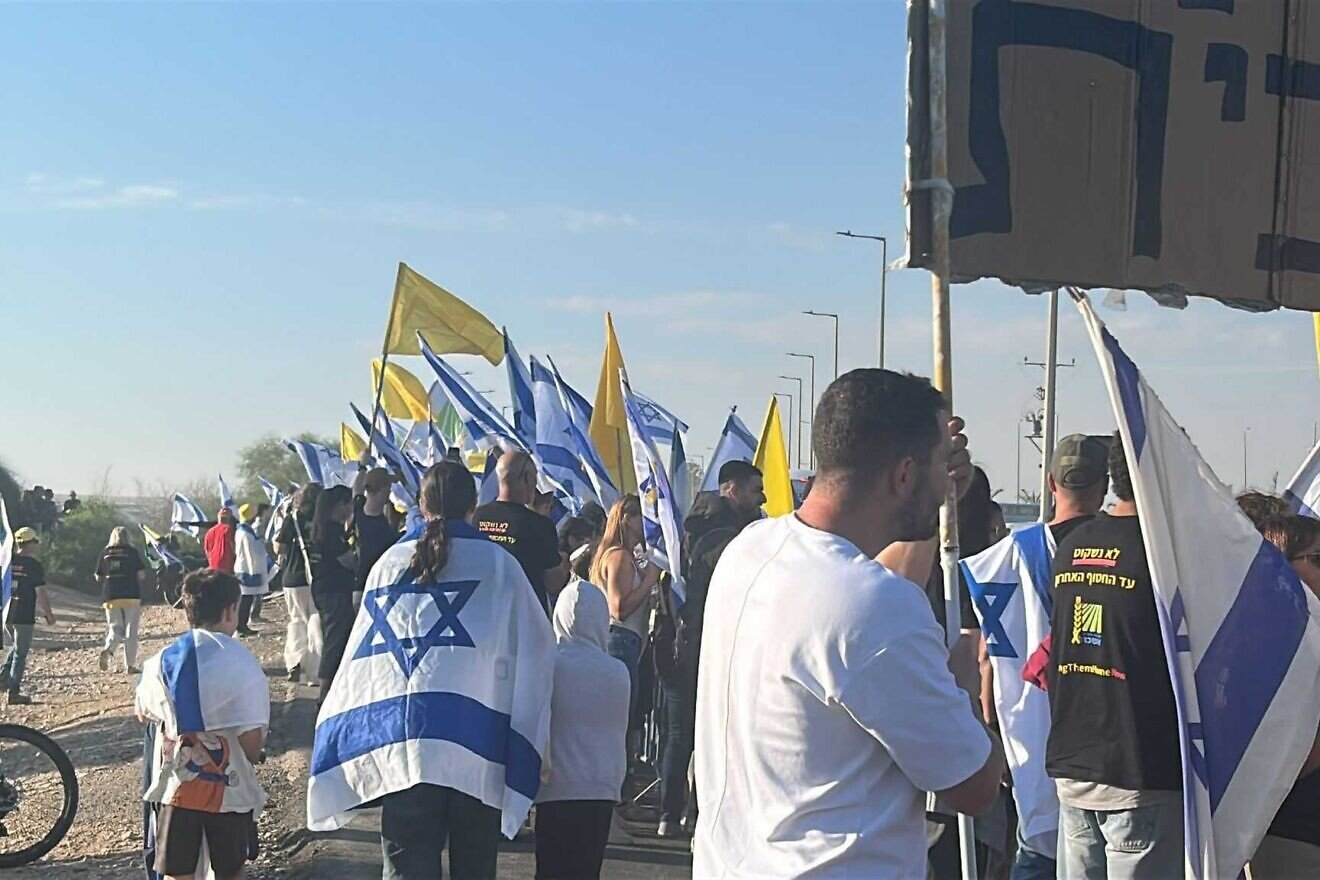

JNS
The first batch of released captives comprises Matan Angrest, twin brothers Gali and Ziv Berman, Alon Ohel, Eitan Mor, Omri Miran and Guy Gilboa-Dalal.
Israel on Monday morning redeemed a first batch of seven hostages held by Hamas, two years after their kidnapping during the Palestinian terrorist group’s Oct. 7, 2023 massacre. Their return is part of the first phase of U.S. President Donald Trump's plan to end the war in the Gaza Strip.
The first batch includes Matan Angrest, twin brothers Gali and Ziv Berman, Alon Ohel, Eitan Mor, Omri Miran and Guy Gilboa-Dalal.
The seven released hostages, accompanied by Israel Defense Forces and Israel Security Agency officers, "crossed the border into the State of Israel a short while ago," said the IDF.
"They are currently on their way to the initial reception point in southern Israel, where they will reunite with their families," the statement continued. "The IDF is prepared to receive additional hostages who are expected to be transferred to the Red Cross later on."
The Israeli Prime Minister's Office previously said that the families of the seven were "informed by the authorized officials that they have joined our forces in the Gaza Strip and will make their way to Israeli territory as soon as possible.
"The Government of Israel, the defense establishment, the Coordinator for Hostages and Missing Persons, and the Directorate for Hostages, Missing, and Returnees in the Prime Minister’s Office will accompany them and their families throughout the entire process of reception and rehabilitation," it continued.
Jerusalem "is committed to bringing back all the hostages held by the enemy and will act to achieve this mission with determination and tireless effort," added the PMO statement.
Hamas is expected to transfer to Israel the remaining 13 living hostages, along with the bodies of most of the 28 captives who have been confirmed dead, later on Monday.
The second round of releases is expected to take place around 10 a.m. local time in the southern Gaza Strip, according to Qatar's Al Jazeera network. The second batch will reportedly include Rom Braslavski, Eitan Horn, Nimrod Cohen and Elkana Bohbot.
 Crowds gather ahead of the release of the hostages near Re'im military base in southern Israel. Photo by Amelie Botbol.
Crowds gather ahead of the release of the hostages near Re'im military base in southern Israel. Photo by Amelie Botbol.
The seven hostages were received by the International Committee of the Red Cross, which transferred them to the IDF inside Gaza. There, military medical teams will carry out initial examinations, and those requiring urgent care will be airlifted to Barzilai Medical Center in Ashkelon or Soroka Medical Center in Beersheva.
If their condition permits, the freed hostages will travel in an IDF convoy to the Re’im military base, where their families will be waiting. The base has been prepared with 20 private rooms designated for reunions and thorough medical assessments.
IDF Chief of Staff Lt. Gen. Eyal Zamir led "Operation Returning Home" from the Military Intelligence Directorate’s Headquarters of the Hostages and Missing Persons on Monday morning.
"This is a very significant day; we are succeeding in implementing a main part of the war's defined objectives," Zamir told commanders and soldiers as the operation got underway, according to an IDF readout.
"After two years of one of the hardest wars we have known, this event is concluded, but not yet complete, and we are closely monitoring the situation in the field," he added. "The IDF will not cease for a moment in carrying out this sacred mission, until the return of the last hostage."
Israeli Prime Minister Benjamin Netanyahu and his wife, Sara, included a personal note to the returning hostages in a reception kit prepared for them, the Prime Minister’s Office said on Monday morning.
The kit contains clothing and personal items, as well as a laptop, cellphone and tablet to assist the freed hostages in reintegrating, according to the PMO.
The handwritten note from the Netanyahus reads: “On behalf of the entire Israeli people, welcome back! We waited for you and embrace you.”
Following the reunion at Re'im, the hostages are to be flown to hospitals across the country, which have already cleared dedicated departments.
Meanwhile, the Palestinian prisoners set for release will be held on buses outside Israeli jails. The vehicles will only depart for the border crossings once all surviving hostages are confirmed to be safely in Israeli hands.
Jerusalem has agreed to release 1,950 Palestinian security prisoners, including 250 who are serving life sentences for deadly attacks, as well as 1,700 Palestinians arrested since Oct. 7, 2023.
After the freed hostages have arrived in Israel, the Red Cross convoy will return to Gaza to recover the bodies of the deceased.
The bodies will be draped in Israeli flags and transported to Re'im, where they will be greeted by an honor guard and a prayer led by a military rabbi.
Israel’s Ministry of Religious Services is prepared to then receive the remains at the National Institute of Forensic Medicine at Abu Kabir in Tel Aviv for final examination.
The ministry’s director-general, Yehudah Avidan, said Sunday that the institute holds intelligence files on each of the fallen to help expedite their identification.
Avidan told Reshet Bet that most of the 28 murdered hostages have already been declared dead by a special committee led by the Chief Rabbinate, allowing widows to remarry in accordance with Jewish law.
“There’s no chance of error,” he stressed, explaining that the committee acted solely on solid evidence provided by Israeli intelligence agencies.
Noting that some families already observed the seven-day mourning period known as shivah, Avidan said that the Religious Services Ministry would assist the families in holding a “new funeral.”